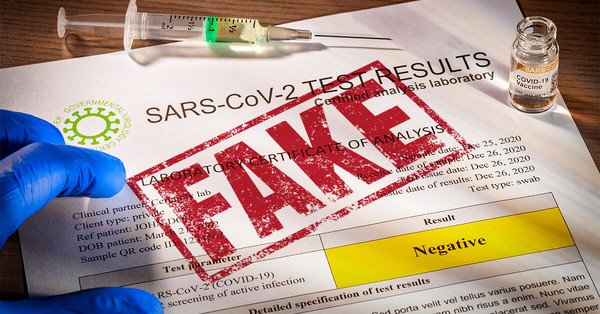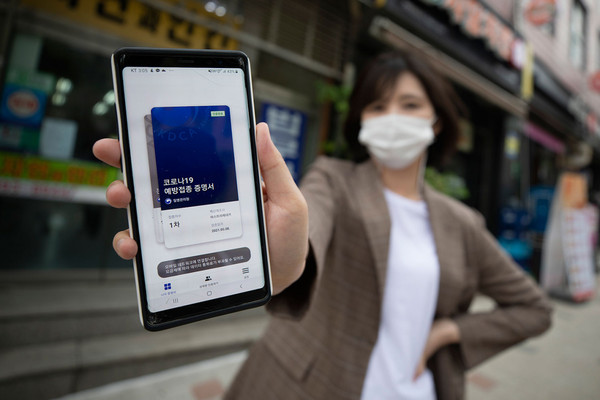
The issue of the effectiveness of the vaccine pass system, which allows only those who have completed the COVID-19 vaccination or have received PCR negative test results to enter certain places, is trending. Self-employed people, students, and unvaccinated people protested against the government's quarantine pass being applied to restaurants and cafes. There are even individual and class action lawsuits appearing across the country. Amid the beginning of such legal disputes, the courts' judgments about the issue have also been inconsistent. The confusion among citizens is further maximized due to such conflicting court decisions, with some applications for suspension of the vaccine pass being accepted and some being rejected.
The government's vaccine pass
Vaccine passes are a measure to restrict people who have not been vaccinated against COVID-19 from using various facilities. The current government policy states that the vaccine pass can be used by those for whom at least 14 days have passed since their first vaccination and less than 6 months (180 days) after receiving two vaccinations of Pfizer, Moderna, AstraZeneca, and Novavax. In addition, it includes those for whom 14 days and less than 6 months have passed after one Janssen dose. If someone has been vaccinated overseas, they are classified as having passed the same period after completing the vaccination with a vaccine approved by the Ministry of Food and Drug Safety or a vaccine approved by the WHO. If the third vaccination is completed, there will be no expiration date for the vaccine. However, the contents of these vaccine pass measures are constantly being adjusted according to the number of confirmed patients and the status of the virus. Furthermore, some think that this vaccine pass itself is a measure that excessively limits the basic rights of non-vaccinated people with COVID-19, and social debate continues due to this conflict of opinion.
On January 17, the COVID-19 Central Disaster Management Headquarters announced on its website that it would lift the requirement for quarantine passes for six types of facilities in consideration of the possibility of regular wearing of masks and saliva generation in the facilities. The facilities include academies, movie theaters, performance halls, reading rooms and study cafes, museums, art galleries, libraries, shops, marts, and department stores. On the other hand, there are 11 types of facilities that still require vaccine passes, including entertainment facilities, indoor sports facilities, karaokes, saunas, race grounds, casinos, PC rooms, restaurants and cafes, party rooms, massage facilities, and (indoor) sports venues. And the Headquarters decided that although the number of confirmed cases is decreasing in the case of adolescents aged 12 to 18, the proportion remains at over 25%, so it is necessary to continue to require the vaccine pass. In particular, the government said it expects the courts' decision on the requirement of youth vaccine passes to change as learning facilities are excluded from the vaccine pass list and applied to high-risk facilities that are not essential for learning. They noted that the adjustment of vaccine passes is not a permanent measure, but a temporary measure adjusted according to quarantine and epidemic conditions and can be adjusted again in case of worsening quarantine conditions. To ease the burden of checking vaccine passes on facilities (operators), they added that they have planned to revise guidelines and laws related to vaccine passes, such as imposing fines only for intentional violations.

Public reaction and the decision of the court
As above, on January 17, the Ministry of Health and Welfare lifted vaccine passes at large stores over 3,000 square meters, department stores, grocery stores, academies, etc. In this way, the Ministry announced the withdrawal of the requirement for quarantine passes for some facilities, but lawsuits and accusations from the public are continuing. In response, Son Youngrae, head of the social strategy team at the Central Disaster Management Headquarters, said on the 25th of the same month, "After adjusting the scope of the quarantine pass, applicants withdrew the application for suspension of execution itself."1) From this emphasis, he seems to expect mediation in other lawsuits. However, contrary to the government's explanation, litigation battles are continuing across the country. The National Litigation Federation against the Vaccine Pass and the National Federation of Parents Organizations, which led to the political disposition of quarantine passes for educational facilities, filed a lawsuit to suspend vaccine passes in Incheon on January 26. They demanded the lifting of the vaccine pass altogether and the suspension of the policy to expand it to 12-18 years old. Lee Dongwook, chairman of the National Litigation Federation against the Vaccine Pass, held a press conference on the 27th of the same month and said, "We will proceed with lawsuits in 16 metropolitan cities and provinces nationwide."2) So there seems to be no sign of an end to the nationwide lawsuit. Also, Cho Doohyung, a medical professor at Yeungnam University, and others, including 309 Daegu citizens, filed a lawsuit for invalidation of the vaccine pass and an injunction to suspend execution with the Daegu District Court on the 24th. They are also filing a lawsuit in Seoul to seek its invalidation. Like these, lawsuits are in progress for each local government.
The influence of the court's decision on the direction of this vaccine pass cannot be ignored. Looking at the case of suspension of vaccine passes, which has been in play since January 16 this year, the first decision was made to temporarily suspend the requirement of vaccine passes for academies, reading rooms, and study cafes announced by the Seoul Administrative Court on January 4. The court concluded, "Among the follow-up measures taken by the Minister of Health and Welfare on December 3, 2021, the inclusion of academies, reading rooms, and study cafes as requiring vaccine passes will be suspended until the date of the judgment on the merits." Subsequently, on the 14th, a decision was made by the court to temporarily suspend the measure to expand the age of those needing vaccine passes in the Seoul area to those who are 12-18 years old. However, there have also been judgments that differ considerably from what the court has decided so far. On January 14, the Seoul Administrative Court rejected the application to suspend the vaccine passes in large-scale stores over 3,000 square meters. Also, the court rejected all applications for suspension of execution filed by the National Federation of Parents Organizations and the National Litigation Federation against the Vaccine Pass against the government's vaccine pass policy on January 28. The subjects of this suspension application were 11 types of facilities, including restaurants, cafes, and karaokes, in addition to the six types that the government had already lifted. The court acknowledged the need for a quarantine pass in the face of the spread of the Omicron virus. They said, "If we add to the current situation where the number of infected is rapidly increasing due to the Omicron virus, it is difficult to deny the public interest. It is that even unvaccinated people should be restricted from using facilities by implementing vaccine passes to control the number of severely ill patients." The reason why the courts ruled differently was that the scope of each case was different, and the administrative agencies defined by the applicants in each case were also different. Moreover, the effectiveness of the vaccine pass and the public interest to be achieved by the vaccine pass were different from the judgment on the degree of basic rights infringed upon by it.

Continuing debate and the other countries
Amid this controversy, JTBC News held a discussion with a panel of experts on the pros and cons of the vaccine pass policy on January 26. Cho Doohyung, a medical professor at Yeungnam University, and Yoon Yongjin, a lawyer, attended the debate in opposition. On the other side, Lee Jaegap, a professor of infectious diseases at Hallym University Medical School, and Jung Jaehoon, a professor of preventive medicine at Gachon University Medical School, attended in support of the policy. Professor Cho of the opposition argued that the coercion of vaccines through vaccine passes threatens the right to life beyond infringement of basic rights because it causes major side effects such as death. On the other hand, Professor Lee said, "Compared to unvaccinated people, the death prevention effect was proven to be 99% among the elderly after receiving the third vaccination."3) In other words, he argued that although some unvaccinated people are restricted from entering multi-use facilities through vaccine passes, the passes are necessary considering the level of risk that unvaccinated people will face if infected. In addition, Professor Jung said that social discussions on excessive infringement of basic rights are necessary, but a vaccine pass is more essential. He said that the application of vaccine passes at certain times or places is inevitably necessary and that there is little social public interest for excessive restrictions on basic rights or expanding the scope of vaccine passes. He then stressed that there is objective data that the unvaccinated are more likely to become critically ill than the vaccinated, adding that the vaccine is not 100% safe, but the benefits are overwhelming enough to get vaccinated even at the risk of adverse reactions.

Looking at other countries in relation to vaccine passes, a group of hackers who forged and sold vaccine passes in Europe were caught during its implementation. They stole the doctor's name in France and sold their forged vaccination certificates to more than 62,000 people. They began to make fake certificates to make it appear that some people had been vaccinated against COVID-19 by illegally accessing the doctor's account that could issue vaccination certificates. In France, citizens need a vaccination certificate in the form of a QR code to enter multi-use facilities or use public transportation over long distances, while the EU has introduced an EU Digital COVID Certification. The certification is valid in all member states, but large-scale protests by citizens against it continue in the current situation. In November 2021, the Biden administration imposed a mandatory vaccination at private workplaces, requiring regular inspections and masks if employees were not vaccinated, and imposing fines on companies if they did not comply with the guidelines. However, after an appeal, the U.S. Supreme Court ruled that the U.S. government had exercised too much power on January 13. And the policy to increase the neutrality rate was nullified. As all six conservative Supreme Court justices opposed the compulsory decision, the Supreme Court ruled that "COVID-19 will spread to homes, schools, and sports stadiums. These dangers are no different from those of crime, pollution, and other infectious diseases."4) So the court stressed that If vaccination is enforced in this situation, it could affect the daily lives and health of many employees. In response, Biden said that it is regrettable that the Supreme Court has decided to prevent compulsory scientific and legal vaccine measures to save the lives of employees in large workplaces. In these ways, issues and debates about vaccine passes are actively taking place in foreign countries beyond Korea.

Why and which vaccine passes?
The COVID-19 Central Disaster Management Headquarters noted that the vaccine pass is an important means of protecting unvaccinated people who are more likely to be infected than the vaccinated, blocking the movements of unvaccinated people, securing room for COVID-19 epidemic control and medical response, and replacing social distancing. It seems that the world should seek a rational point between the vaccine pass and basic rights by considering the purpose of the government's continuously revised vaccine pass, how the system is being implemented, and whether the standards are appropriate.
1) Oh Hyunah, "Endless Vaccination Pass Lawsuits", Hangyung, Jan 27, 2022
2) See Footnote 1
3) You Hyeun, ""Even If We Get a Vaccine, the Number of Coronic Increases" vs. "We Have to Prevent Unvaccinated People from Being Infected"…The Pros and Cons of Quarantine Passes", JTBC, Jan 26, 2022
4) Lee Euijin, "Biden's Vaccine at a Conglomerate Has Been Stranded...Supreme Court, "Out of Legal Power"", Yonhapnews, Jan 14, 2022


